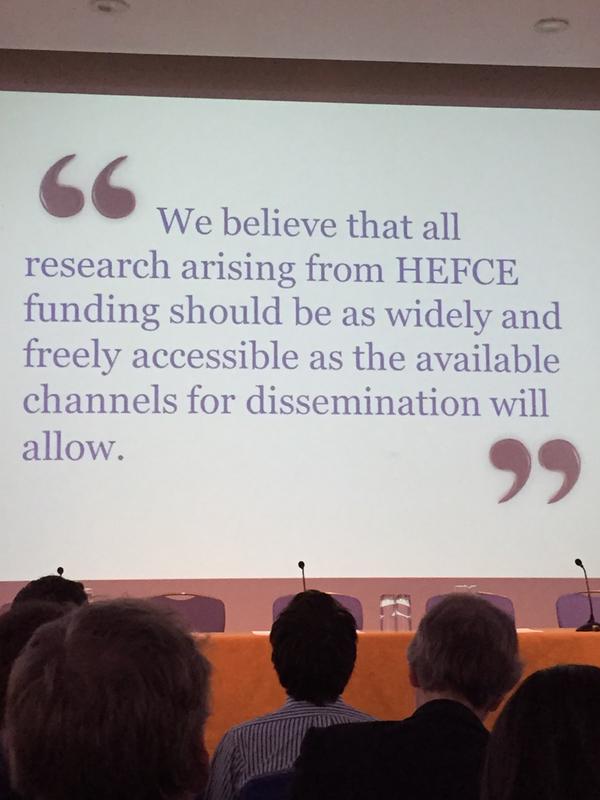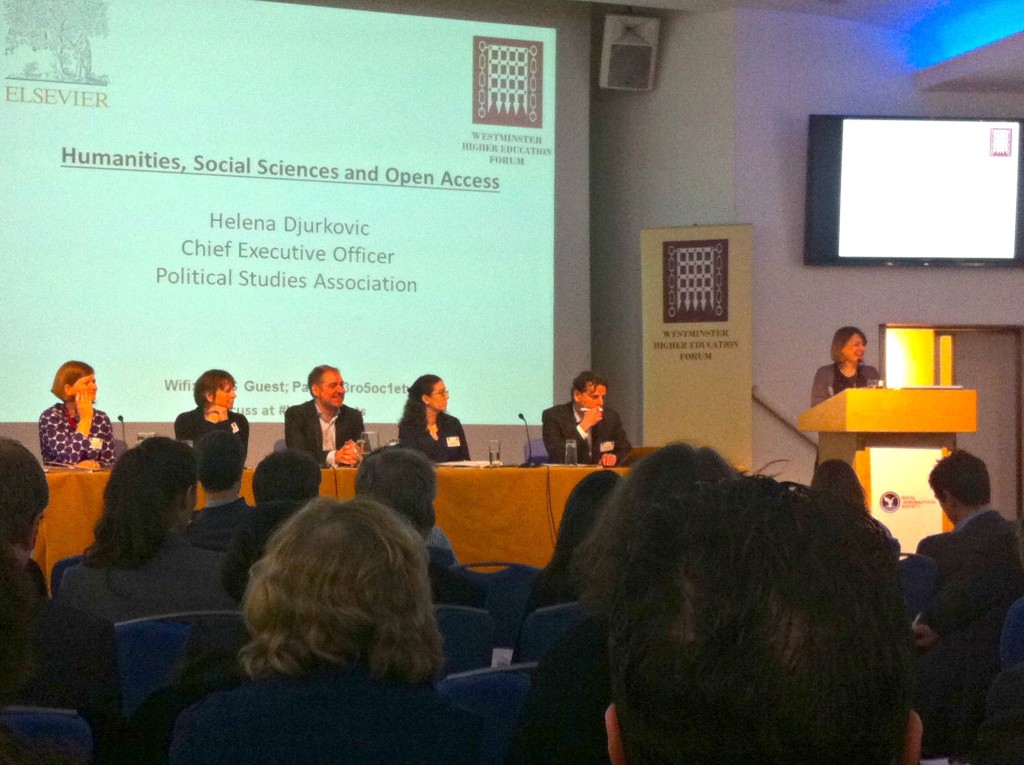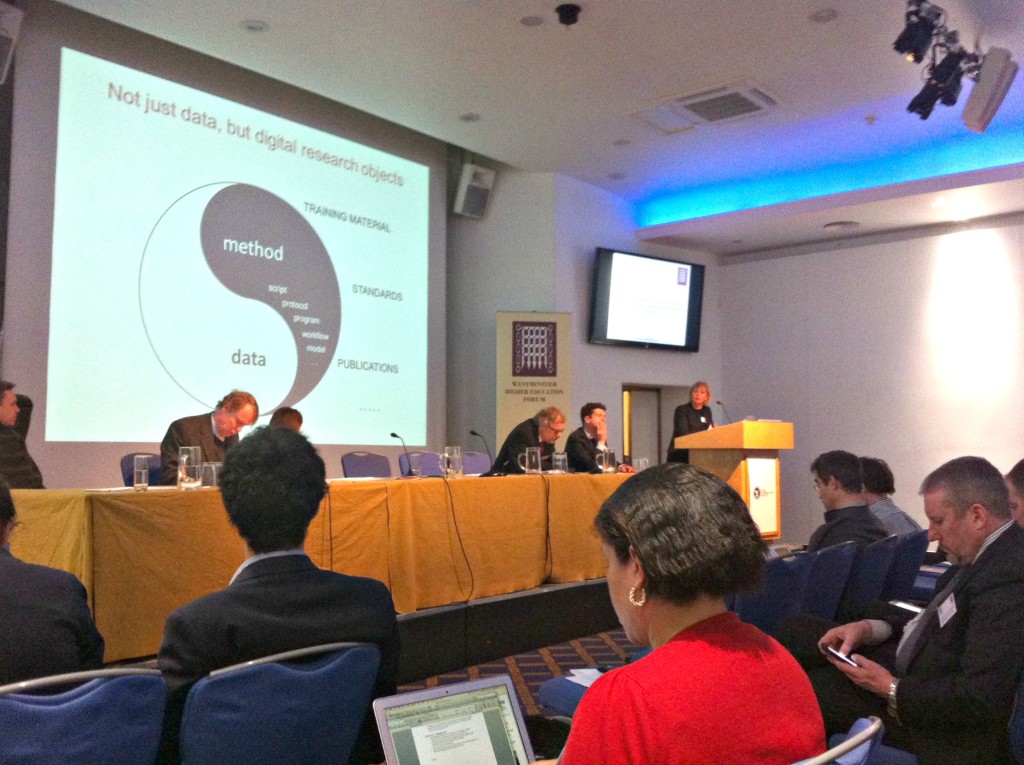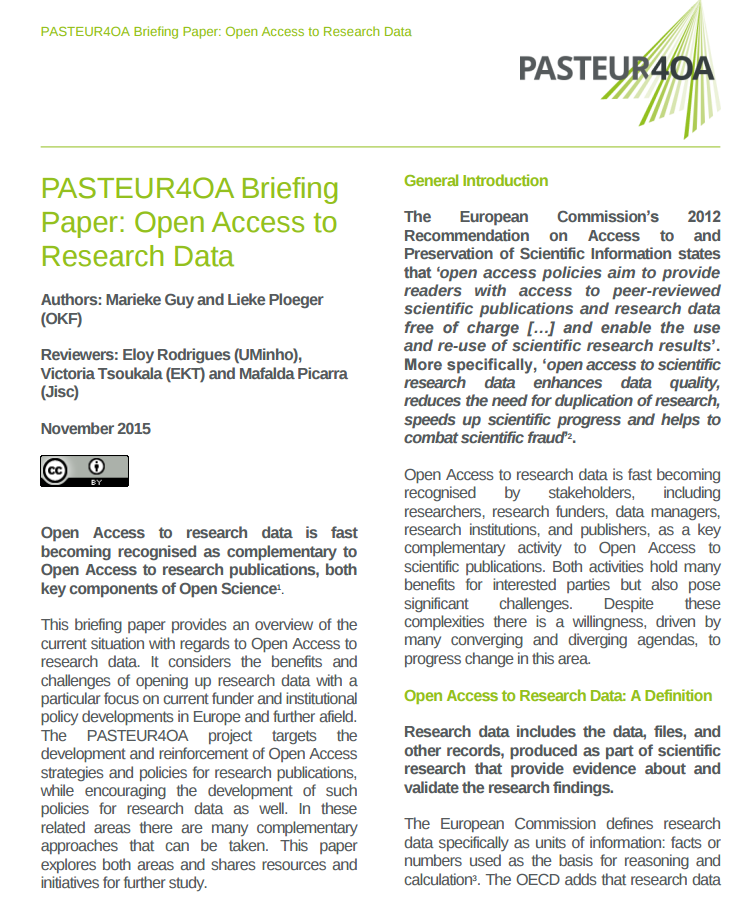Last week, timed to coincide with the publication of RCUK’s review of the impact of Open Access so far, Westminster Higher Education Forum ran a one-day event on the Future for Open Access and the move towards Open Data. This move is in part driven by the UK government’s recent support for open scientific research data where “the default position of the results of publicly funded scientific research data should be one of Open Data, subject to concerns of privacy, security and commerciality.”

Image courtesy of Sarah Malloy on Twitter
It was a well-attended event that brought together an amalgam of publishers, University research managers, government officials and research librarians to share best practice in dealing with the key remaining Open Access implementation issues for UK Higher Education sector. The full agenda for the workshop is available online.
In his opening Chris Tyler, Director of the Parliamentary Office for Science and Technology, pointed out that Open Access and Open Data have in the past been two big topics that continued to exist as part of separate tracks and debates. The occasion of a joint workshop shows that these tracks were now beginning to converge and offers great opportunities for more joined up thinking.
Open Access
The initial session saw introductions to key current policies: The RCUK policy on Open Access presented by Dr Tony Peatfield and the HEFCE Open Access policy laid out by Dr Steven Hill. The main difference between the two policies is the level of mandate required. In the RCUK policy authors must publish in an RCUK Open Access compliant journal, ideally this journal should achieve gold compliance (CC-BY), or green 6(12) months post print. There is an expectation of 100% compliance by March 2018, 75% of which should be gold. The recent review of the policy has shown excellent engagement so far by institutions with 94% compliance which has exceeded the 2014/15 targets. Interestingly the review also found that actual Article Processing Costs (APCs) paid are lower than anticipated by the Finch report. HEFCE offers a less formal policy that states that “to be eligible for submission to the post-2014 REF, authors’ final peer-reviewed manuscripts must have been deposited in an institutional or subject repository on acceptance for publication… This requirement will apply to journal articles and conference proceedings accepted for publication after 1 April 2016.” HEFCE’s thinking is that 96% of journal articles could be compliant with the policy already, resulting in the challenge being one of action, not one of policy. Note that monographs are excluded from the HEFCE policy, though HEFCE have commissioned a recent report from Geoff Cronnick on Monographs and Open Access in partnership with the Arts and Humanities Research Council (AHRC) and the Economic and Social Research Council (ESRC).

Panel: Open Access in practice ‐ progress, remaining challenges and next steps for policy. Panelists (L to R): Ciara Eastell, Alma Swan, David Ross, Rachel Beaton, Neil Jacobs and Helena Djurkovic
Prior to the Open Access panel session we heard from Helena Djurkovic, Chief Executive Officer from the Political Studies Association: a small but long established learned society which derives over 60% of its revenues from journal publishing. Helena admitted that the Political Studies Association are not huge enthusiasts for UK Open Access policy, which they feel has been shaped by the life science community. She explained that for the Humanities and Social Science disciplines embargo periods of less than 24 months could threaten viability of subscription journals. She personally believes that Open Access policy could restrict academic choice and innovation, and undermine standing of British Humanities and Social Science research. She expressed her feeling that CC-BY is “unnecessary and risky”. Helena quoted the 2014 Open Access Journals In Humanities And Social Science report commissioned by the British Academy and written by Rebecca Darley, Daniel Reynolds and Chris Wickham. The report concludes that: “‘gold’ open access (the instant availability of publishers’ versions of articles on the internet in return for payment) is going to be of marginal importance in HSS“. Helena also stated concern over the lack of understanding of policies among academics and librarians and argued that if money was to be spent it should be put towards ‘writing for the public’ in order to make things more accessible. While Helena does not represent all Humanities and Social Science academics she does raise some valid points that do need addressing by those creating and implementing policy.
The proceeding panel session looked at a number of different questions relating to the RCUK Policy on Open Access including challenges to implementation, likelihood of compliance, likely impact of the changes to the requirements of eligible outputs for the post 2014 REF on Open Access publication, and whether RCUK block grants for research council supported organisations have addressed concerns about article processing charges. The panelists were David Ross, Executive Publisher for Open Access, SAGE Publications; Dr Alma Swan, Director, SPARC Europe and partner on the PASTEUR4OA Project; Rachel Beaton, Research Policy Officer, University of Stirling; Ciara Eastell, Head of Libraries, Culture and Heritage, Devon County Council and President, Society of Chief Librarians; Dr Neil Jacobs, Head of Scholarly Communications Support, Jisc – another partner on the PASTEUR4OA Project, and also previous speaker Helena Djurkovic.
Much of the discussion centred on the cost to institutions of implementing RCUK policy (cited as being around 9.2 million pounds in the Counting the Costs of Open Access report by Research consulting limited) and the main current challenges. One interesting observation made by Rachel Beaton was that in the past they have had problems knowing which outputs (published articles) came from which funders, they have now updated their Research Management System to reflect this. Other challenges highlighted include managing the changing scholarly publishing model, so for example previously submission and acceptance of journal articles was a private process between journal and academic publisher, this is no longer the case. This process is now a more inclusive process that includes the funder and the institution, see more thoughts on this on the Jisc blog. However as some pointed out this is changing process that is currently not policed by funders.
Moving on to future opportunities the panelists were keen to point out best practice: ROARmap and PASTEUR4OA work was cited and the University of Liege awarded a gold star for having the highest rate of peer reviewed article deposit in a repository at 87%. The Jisc Open Access Good Practice work also offers pointers for publishers and others to enable them to navigate the changing landscape e.g. by sending a manuscript to all authors and their institutions on accceptance, by being clearer about permissions etc. Ciara Eastell, President Society of Chief Librarians highlighted the government-funded Access to Research initiative in which over 10 million academic articles have been made available free of charge in participating public libraries across the UK. Although this isn’t Open Access per se it is a move to enable access.
Open Access to Research Data
The post-coffee session progressed the discussion from Open Access of published outputs to Open Access to research data. While RCUK has the Common Principles on Data Policy HEFCE have yet to fully mandate on access to research data. Interestingly the morning session had already raised the issue of consensus around Open Data and inevitably standards. While some delegates had argued that open research data standards are already in place (e.g. Sword; Cerif; metadata for discovery; citation data) others felt that there is still a need for further definition work (by discipline).
Oliver Buckley, deputy director, government transparency and Open Data from the cabinet office opened the session by giving an overview of the government’s activities and aspirations in the Open Data space. His analogy was that Open Data was like a child with two very different parents: one being Open Access and citizen engagement (the greater good) and the other being the data economy (making money). He was clear to point out that Open Data is not magical by itself but it is in what can be done with Open Data, and in particular frictionless data, that the potential lies: accountability, improving public services, economic growth etc.
While Oliver had focused on more general Open Data, in the second panel session of the day Nicola Perrin, Head of Policy at the Wellcome trust and Susanna-Assunta Sansone, Associate Director, Oxford e‐Research Centre were very keen to pull the focus back to research data. Nicola explained that at the Wellcome Trust they have been looking at how to make academic research data more accessible by encouraging a shift in culture and mentality. Their main activity has been around improving recognition for data sharing through a data sharing concordat and discoverability of data-expeditions. They see policy as a useful enabler and are committed to funding data sharing plans in the future. Susanna was keen to point out the need for career paths for data scientists and felt that there was still more exploratory work to be carried out to understand discipline specific data and a need to have tools/software available to understand the data shared. She urged us at this stage to not talk about Open Data but digital research objects that are not open but accessibility. The work advocating for FAIR research objects – Findable, Accessible, Interoperable, Reusable has made significant progress amongst academics. The Data Discovery Index (DDI) is a good example of National Institutes of Health (NIH) organisations working together to support FAIR research objects.

Panel: Moving towards a culture of Open Data. Panelists (L to R): Chris Tyler, Roger Bickerstaff, Nicola Perrin, IJsbrand Jan Aalbersberg, Oliver Buckley, Susanna-Assunta Sansone
The other panelists also had their own perspectives on how research data could fit in the broader Open Data ecosystem. Roger Bickerstaff, Partner and Joint Head, International IT Sector Group, Bird & Bird spoke on how opening up data would potentially shine a light on particular areas of work possibly exposing inconsistencies and quality issues, and that this initially would be a matter for concern among some. He pointed to European legislation on reuse of public sector information known as the PSI directive, which provides a common legal framework for a European market for government-held data, as being an example of the route for progress. IJsbrand Jan Aalbersberg, SVP Journal and Data Solutions, Elsevier, spoke of how they are advocating for subject specific repositories, as oppose to institutional ones, calling attention to another discussion that still continues. Other topics that were explored tangentially included mandating around ORCHID Ids (HEFCE plan to do this for the next REF) and the personal data / privacy debate
In his closing remarks Chris Tyler asked what role might universities play in addressing these challenges. There is already a new trend for the cost of data sharing be added in to project proposals, maybe the shift in mentality could go further with more recognition for data managers and better status of data sharing? He also made a call for arms to allay researchers’ fears associated with adhering to an Open Data culture, (e.g. worries around data quality, incorrect attribution and misinterpretations of data etc.).
The day, albeit short, felt like a microcosm of the current scholarly publishing situation in which the tensions between Higher Education Institutions and publishers, and between disciplines, had been perfectly revealed. Open Access and Open Access to Research Data both pose many challenges for Higher Education to steer, and those working as part of the open movement would be both naive and foolish to overlook this. However there is a willingness, driven by many converging and diverging agendas, to progress change in this area.
It seems clear that positive change is likely to mean compromise for some, but will definitely require collaboration by all.
 Open Access Working Group
Open Access Working Group 






Knowledge Creation to Diffusion: The Conflict in India
Michelle Brook - February 28, 2014 in Comment, Guest Post, Policy
This is a guest post by Ranjit Goswami, Dean (Academics) and (Officiating) Director of Institute of Management Technology (IMT), Nagpur, India. Ranjit also volunteer as one of the Indian Country Editors for the Open Data Census.
Developing nations, more so India, increasingly face a challenge in prioritizing its goals. One thing that increasingly becomes relevant in this context, in the present age of open knowledge, is the relevance of subscription-journals in dissipation and diffusion of knowledge in a developing society. Young Aaron Swartz from Harvard had made an effort to change it, that did cost him his life; most developed nations have realized research funded by tax-payers money should be made freely available to tax-payers, but awareness on these issues are at quite pathetic levels in India – both at policy level and among members of academic community.
Before one looks at the problem, a contextual understanding is needed. Today, a lot of research is done globally, including some of it in India, and its importance in transforming nations and society is increasingly getting its due recognition across nations. Quantum of original application oriented research, applicable specifically to the developing world, is a small part of overall global research. Some of it is done locally in India too, in spite of two obvious constraints developing nations face: (1) lack of funds, and (2) lack of capability and/or capacity.
Tax-funded research should be freely available
This article argues that research outcomes, done in India with Indian tax-payers money, are to be freely available to all Indians, for better diffusion. Unfortunately, the present practice is quite opposite.
The lack of diffusion of knowledge becomes evident in absence of any planned efforts, to make the research done in local context available in open platforms. Here when one looks at the academic community in India, due to the older mindset where research score and importance is given only for publishing research papers in journals, often even in journals of questionable quality, faculty members are encouraged to publish in subscription-journals. Open access journals are considered untouchables. Faculty members mostly do not keep a version of the publication to be freely accessible – be it in their own institute’s website, or in other formats online. More than 99% of Indian higher educational institutes do not have any open-access research content in their websites.
Simultaneously, a lot of academic scams get reported, more from India, as measuring research contribution is a difficult task. Faculty members often fall prey to short-cuts of institute’s research policy, in this age of mushrooming journals.
Facing academic challenges
India, in its journey to be an to an open knowledge society, faces diverse academic challenges. Experienced faculty members feel, that making their course outlines available in the public domain would lead to others copying from it; whereas younger faculty members see subscription journal publishing as the only way to build a CV. The common ill-founded perception is that top journals would not accept your paper if you make a version of it freely available. All of above act counter-productive to knowledge diffusion in a poor country like India. The Government of India has often talked about open course materials, but in most government funded higher educational institutes, one seldom sees even a course outline in public domain, let alone research output.
Question therefore is: For public funded universities and institutes, why should any Indian user have to cough up large sums of money again to access their research output? And it is an open truth that – barring a very few universities and institutes – most Indian colleges, universities and research organizations or even practitioners cannot afford the money required to pay for subscribing most well-known journal databases, or afford individual articles therein.
It would not be wrong to say that out of thirty-thousand plus higher educational institutes, not even one per cent has a library access comparable to institutes in developed nations. And academic research output, more in social science areas, need not be used only for academic purposes. Practitioners – farmers, practicing doctors, would-be entrepreneurs, professional managers and many others may benefit from access to this research, but unfortunately almost none of them would be ready or able to shell out $20+ for a few pages by viewing only the abstract, in a country where around 70% of people live below $2 a day income levels.
Ranking is given higher priority than societal benefit
Academic contribution in public domain through open and useful knowledge, therefore, is a neglected area in India. Although, over the last few years, we have seen OECD nations, including China, increasingly encouraging open-access publishing by academic community; in India – in its obsession with university ranks where most institutes fare poorly, we are on reverse gear. Director of one of India’s best institutes have suggested why such obsessions are ill-founded, but the perceptions to practices are quite opposite.
It is, therefore, not rare to see a researcher getting additional monetary rewards for publishing in top-category subscription journals, with no attempt whatsoever – be it from researcher, institute or policy-makers – to make a copy of that research available online, free of cost. Irony is, that additional reward money again comes from taxpayers.
Unfortunately, existing age-old policies to practices are appreciated by media and policy-makers alike, as the nation desperately wants to show to the world that the nation publishes in subscription journals. Point here is: nothing wrong with producing in journals, encourage it even more for top journals, but also make a copy freely available online to any of the billion-plus Indians who may need that paper.
Incentives to produce usable research
In case of India, more in its publicly funded academic to research institutes, we have neither been able to produce many top category subscription-journal papers, nor have we been able to make whatever research output we generate freely available online. On quality of management research, The Economist, in a recent article stated that faculty members worldwide ‘have too little incentive to produce usable research. Oceans of papers with little genuine insight are published in obscure periodicals that no manager would ever dream of reading.’ This perfectly fits in India too. It is high time we look at real impact of management and social science research, rather than the journal impact factors. Real impact is bigger when papers are openly accessible.
Developing and resource deficit nations like India, who need open access the most, thereby further lose out in present knowledge economy. It is time that Government and academic community recognizes the problem, and ensures locally done research is not merely published for academic referencing, but made available for use to any other researcher or practitioner in India, free of cost.
Knowledge creation is important. Equally important is diffusion of that knowledge. In India, efforts to resources have been deployed on knowledge creation, without integrative thinking on its diffusion. In the age of Internet and open access, this needs to change.
Prof. Ranjit Goswami is Dean (Academics) and (Officiating) Director of Institute of Management Technology (IMT), Nagpur – a leading private B-School in India. IMT also has campuses in Ghaziabad, Dubai and Hyderabad. He is on twitter @RanjiGoswami
Tags: development, incentive structures, India, open access, policy 1 Comment »